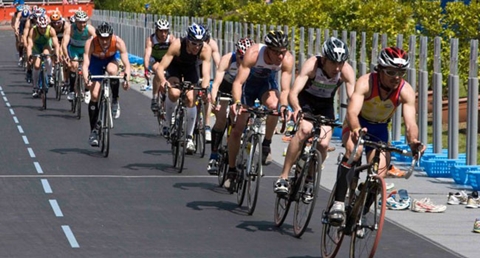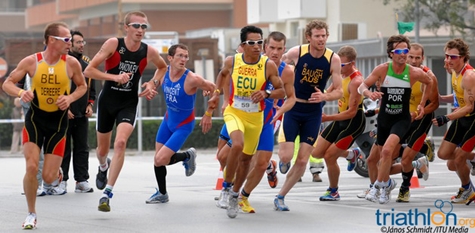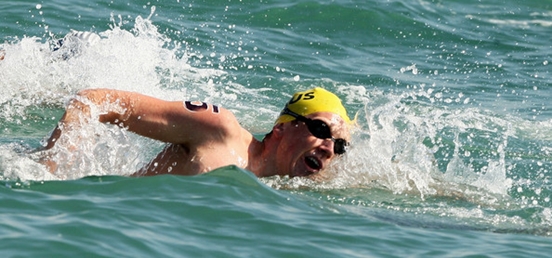How to Fit Marathon Training into a Busy Schedule
If you are a runner with a goal to run your first marathon or run a PR marathon then you no doubt been exposed to your share of advice. If your years of training and researching about how to train for a marathon or how to improve your marathon PR have resulted in frustration, self-doubt, and confusion, then read on. The next few paragraphs may provide you with what youíve been looking for.
The Best Training Program
Training for a marathon does take a lot of time, commitment, and determination. A lot of marathon training programs out there involve at least six days per week of training. This type of program takes up a lot of time and makes it difficult to balance with your work life, family, social time, etc. However, that many days per week or running is not necessary and only leads to burnout and injury. The good news.....Four quality runs per week over a fourteen to sixteen week period is an appropriate and efficient program that will get you successfully to the finish line. Keep this in mind: Less is More!
Training and running more may not necessarily lead to better results. If anything, it will lead to a break down of the muscles and the mind. Simply stated, this is too much running and the exact reason why runners who run so many days/miles per week experience common injuries such as shin splints, IT Band syndrome, tendinitis, knee pain, etc. To get better and be better, rest days are just as important as running days.
Benefits of a 4 Day Training Week
A marathon training program that has produced the best results for runners with demanding schedule includes four days per week of quality running and three days of good rest. Each run has a different focus and varies with pace, distance, and effort level. A combination of these run workouts is an excellent balance of challenging the body to prepare for the 26.2 mile race. Furthermore, the built in rest days allow muscle recovery and injury prevention.
An example of the 4 day training week:
Monday: Rest
Tuesday: Speed workout (3-4x1-mile repeats)
Wednesday: Easy Run (5-10miles)
Thursday: Rest
Friday: Intervals or Hill workout
Saturday: Rest
Sunday: Long Run (10-20miles)
Your longest long run should be 20 miles and you will do a training build-up of this distance over the course of sixteen weeks. Three weeks before the marathon race will be a taper, during which you gradually reduce mileage.
Running and Strength Training: Increase strength to run faster, longer, efficiently, and injury-free
Marathon runners can benefit greatly from a resistance training program. In fact, most runners will never reach their peak level of performance without strength training.
When I ask marathon runners why they do not perform strength training exercises, the answers are always the same. They feel that the additional pounds added from strength training will be a detriment to performance. Letís attack this prejudice on two fronts. First, the strength training I advise as part of this program is unlikely to cause athletes to gain significant muscle mass. Second, we would all agree on the benefits of replacing a pound of fat with a pound of muscle. Recent research has shown that each pound or muscle burns and extra 200-400 calories per week facilitating this muscle for fat replacement. Who can argue with that?
A stronger body will improve your form, reduce injuries, and make you faster. Running a marathon exacts a great toll on a runnerís body. Strengthening the core and legs will help you better deal with the mileage you will run over the next several months. You donít need expensive equipment or a gym membership to build a stronger body. Body weight exercises can get the job done. In fact, most elite runners do a majority of their strength training in this manner. When I started doing these exercises, I couldnít believe how much stronger I felt and how much my running improved. I did a 6 exercise set, twice a week, and was amazed by the results. Itís simple, but it works.
Furthermore, if you increase your strength, you'll also increase your joint stability, reducing your risk of repetitive stress injuries. Leg exercises are particularly important when it comes to reducing injury in and around the knees which is common for marathon runners. An example of a full body strength circuit includes the following 6 exercises (2-3 sets, 15 reps): Pushups, squats, lunges, dips, wall sit, and plank.
Marathon training will be challenging, but should be fun and enjoyable. Following a plan that does not overdo it on the running should help make the experience a pleasant one. Remember, you can successfully train for and finish a marathon. Believe in yourself and believe in the training program. Once you begin to believe, then you will realize your goal. Finishing a marathon is an accomplishment that less than 1% of people in the world can say they have achieved.
You are about to be one of them!
Jill Bruyere received her B.A. in Exercise Physiology at the University of New Mexico and a Masters degree in Sports Leadership from the University of Washington. Jill has run several marathons, including: Maui, Washington DC, Seattle, Boston, and New York.






